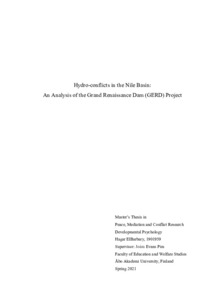Hydro-conflicts in the Nile Basin : An Analysis of The Grand Ethiopian Renaissance Dam (GERD) Project
Elbarbary, Hagar (2021)
Elbarbary, Hagar
2021
All rights reserved. This publication is copyrighted. You may download, display and print it for Your own personal use. Commercial use is prohibited.
Julkaisun pysyvä osoite on
https://urn.fi/URN:NBN:fi-fe2021052531644
https://urn.fi/URN:NBN:fi-fe2021052531644
Tiivistelmä
Water scarcity and the exacerbating climate change, along with the unhindered construction of dams on the transboundary rivers are the main factors of the water disputes all over the world. Some disputes have been managed through cooperative strategies, and others reached a deadlock where the possibility of armed conflicts is possible such as the Grand Ethiopian Renaissance Dam case.
The study analyses the ongoing water conflict between the three Nile Basin Riparian countries Ethiopia, Sudan, and Egypt over the Grand Ethiopian Renaissance dam (GERD).
Three conflict analysis tools have been applied to conduct the conflict analysis, the conflict wheel, INMEDIO’s conflict perspective analysis (CPA), and Glasl’s conflict escalation model.
Results: Lack of trust and transparency between the three conflicted countries is one of the main reasons that led to the escalation of the conflict and turned it from a possible win-win situation into a lose-win situation. Other stakeholder states, such as China, Turkey, and Gulf countries could play a positive mediation role in the conflict since they enjoy close ties with the upstream country Ethiopia. The GERD is not only relevant in economic and development terms, as it has the potential to change the geopolitics of the Middle East and North Africa.
The study analyses the ongoing water conflict between the three Nile Basin Riparian countries Ethiopia, Sudan, and Egypt over the Grand Ethiopian Renaissance dam (GERD).
Three conflict analysis tools have been applied to conduct the conflict analysis, the conflict wheel, INMEDIO’s conflict perspective analysis (CPA), and Glasl’s conflict escalation model.
Results: Lack of trust and transparency between the three conflicted countries is one of the main reasons that led to the escalation of the conflict and turned it from a possible win-win situation into a lose-win situation. Other stakeholder states, such as China, Turkey, and Gulf countries could play a positive mediation role in the conflict since they enjoy close ties with the upstream country Ethiopia. The GERD is not only relevant in economic and development terms, as it has the potential to change the geopolitics of the Middle East and North Africa.
Kokoelmat
- 515 Psykologia [233]
